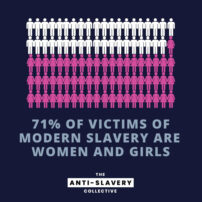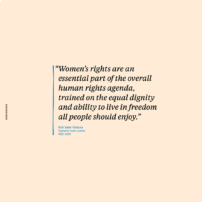Imagine a world where every woman has dignity, respect, and choices.

International Women’s Day (8 March) celebrates women and their achievements, whilst also challenging bias and promoting equality.
Equality for women has not been reached anywhere around the globe. Until we see women be truly valued, protected by laws and having access to assets, opportunities and education, women will continue to be exploited and be vulnerable to modern slavery.
One in every 130 females globally is living in modern slavery. 40 million people globally are in modern slavery, and women and girls account for nearly three quarters (71%) of all those in modern slavery. Although modern slavery affects everyone, there is no escaping that females are most affected. It’s time we all commit to fighting for the millions of women who don’t have freedom.
Women are routinely subject to sexual exploitation, forced marriages, human trafficking and forced labour. Nowhere around the globe is safe and COVID-19 has allowed modern slavery to thrive in the shadows. Life has become more difficult for people, especially for those living in developing countries. Increases in poverty and unemployment, the pandemic and lockdowns have led to millions of people losing their jobs, unable to feed their families. People vulnerable and in desperate circumstances are in danger of being exploited.
Often tricked into sham marriages or lured by the hope of better and more secure jobs, migrant female workers can find themselves very alone, without funds, a passport or visa in foreign countries, and often trapped into the textiles, accommodation or food industries, into domestic servitude, or sold into sexual exploitation.
New Zealand contributes to modern slavery practice. In 2019 alone, New Zealanders imported more than $3.1 billion products at risk of involving slavery in their production. Each week, a New Zealand household spends about $34 on risky products. Unknowingly, kiwis are contributing to slavery and female exploitation through the things we buy. There has never been more urgency for our government to take action against modern slavery and enact Modern Slavery legislation, which would help prevent slavery through transparency and accountability. Legislation would enable businesses to understand the risks of modern slavery in their purchasing, to report on those risks and take action to address them in their supply chains.
Positive political policies and economic recovery around the globe with a focus on relieving poverty, gender inequality and power imbalances due to discrimination, will go a long way to helping women and girls avoid modern slavery. Providing women and girls with access to education is fundamental to ensuring women have strong opportunities and an ability to self-determine their own futures.
We must all help raise awareness, support strong protective legislation and open up conversation, because until women are truly respected and valued by their families, communities and society, women will continue to be marginalised, exploited and vulnerable to modern slavery.
Trade Aid believes in equality for all women and we believe in fair trade practices that empower women and promote equality and equity throughout our supply chains.
Fairness in trade means we try to create opportunity and safe and healthy work environments. We respect labour laws (including the UN Convention on the Rights
of the Child), we follow guidelines for non-discrimination, gender equity and freedom of association and we pay our producers fairly.
Trade Aid is proud to support our Parliament to take action against modern slavery. We hope together we can make real progress towards making a Modern Slavery Act a reality in 2022.
The New Zealand Petitions Committee has responded to the petition of Trade Aid and World Vision and recommends the Government bring legislation addressing modern slavery before the house as soon as possible allowing for adequate policy development and public consideration.
Public consultation for modern slavery legislation will take place in 2022. Trade Aid, World Vision and the Human Rights Commission hope many New Zealanders will submit to support this important legislation.
We look forward to bringing you more updates and how you can get involved soon. Together let’s take action against modern slavery.


Key Sources:
Stacked Odds, Walkfree 2020 report. https://cdn.walkfree.org/content/uploads/2020/10/19130043/WF-Stacked-Odds-20210517.pdf
Risky Goods New Zealand Imports, World Vision NZ 2021 report.
Toward a Modern Slavery Act in New Zealand – Legislative landscape and steps forward. Christina Stringer, Brent Burmester, Snejina Michailova Centre for Research on Modern Slavery, The University of Auckland Business School and Thomas Harré LawAid International 2021 White Paper